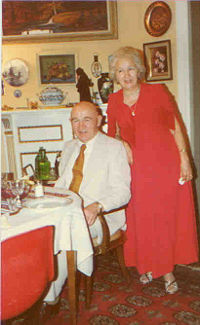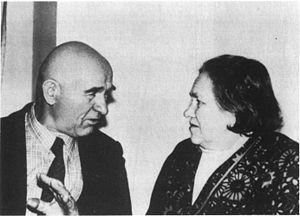
Pyotr Grigorenko
Encyclopedia

Soviet Army
The Soviet Army is the name given to the main part of the Armed Forces of the Soviet Union between 1946 and 1992. Previously, it had been known as the Red Army. Informally, Армия referred to all the MOD armed forces, except, in some cases, the Soviet Navy.This article covers the Soviet Ground...
commander of Ukrainian
Ukrainians
Ukrainians are an East Slavic ethnic group native to Ukraine, which is the sixth-largest nation in Europe. The Constitution of Ukraine applies the term 'Ukrainians' to all its citizens...
descent, later a prominent Soviet
Soviet Union
The Soviet Union , officially the Union of Soviet Socialist Republics , was a constitutionally socialist state that existed in Eurasia between 1922 and 1991....
human rights activist, dissident
Dissident
A dissident, broadly defined, is a person who actively challenges an established doctrine, policy, or institution. When dissidents unite for a common cause they often effect a dissident movement....
and writer.
Early life
Petro Grigorenko was born in a village of rural Zaporizhzhia Oblast, UkraineUkraine
Ukraine is a country in Eastern Europe. It has an area of 603,628 km², making it the second largest contiguous country on the European continent, after Russia...
. He went on a military career and reached high ranks during the World War II
World War II
World War II, or the Second World War , was a global conflict lasting from 1939 to 1945, involving most of the world's nations—including all of the great powers—eventually forming two opposing military alliances: the Allies and the Axis...
. After the war, being a decorated veteran
Veteran
A veteran is a person who has had long service or experience in a particular occupation or field; " A veteran of ..."...
, he left active career and taught at the Frunze Military Academy, reaching the rank of a Major General
Major General
Major general or major-general is a military rank used in many countries. It is derived from the older rank of sergeant major general. A major general is a high-ranking officer, normally subordinate to the rank of lieutenant general and senior to the ranks of brigadier and brigadier general...
.
In 1949, Grigorenko defended his Ph.D. thesis on the theme “Features of the organization and conduct of combined offensive battle in the mountains.”
In 1960, he completed the work on his doctoral thesis.
Dissident activities

Nikita Khrushchev
Nikita Sergeyevich Khrushchev led the Soviet Union during part of the Cold War. He served as First Secretary of the Communist Party of the Soviet Union from 1953 to 1964, and as Chairman of the Council of Ministers, or Premier, from 1958 to 1964...
's policies and was transferred to Russian Far East
Russian Far East
Russian Far East is a term that refers to the Russian part of the Far East, i.e., extreme east parts of Russia, between Lake Baikal in Eastern Siberia and the Pacific Ocean...
as punishment. In 1963 he created the Union of Struggle for the Restoration of Leninism
Leninism
In Marxist philosophy, Leninism is the body of political theory for the democratic organisation of a revolutionary vanguard party, and the achievement of a direct-democracy dictatorship of the proletariat, as political prelude to the establishment of socialism...
. In the 1970s Grigorenko became a member of the Moscow Helsinki Watch Group. The authorities sent him to a psychiatric imprisonment psikhushka
Psikhushka
In the Soviet Union, systematic political abuse of psychiatry took place. Soviet psychiatric hospitals were used by the authorities as prisons in order to isolate hundreds or thousands of political prisoners from the rest of society, discredit their ideas, and break them physically and mentally...
from 1964–1965, and he was stripped of his military rank, medals, and retirement benefits.
After his release, Grigorenko actively participated in the struggle for the Crimean Tatar
Crimean Tatars
Crimean Tatars or Crimeans are a Turkic ethnic group that originally resided in Crimea. They speak the Crimean Tatar language...
autonomy, and demonstrated against the 1968 Soviet invasion of Czechoslovakia
Prague Spring
The Prague Spring was a period of political liberalization in Czechoslovakia during the era of its domination by the Soviet Union after World War II...
and became a leading figure in Soviet human rights movement along with his fellow celebrated dissidents Vladimir Bukovsky
Vladimir Bukovsky
Vladimir Konstantinovich Bukovsky is a leading member of the dissident movement of the 1960s and 1970s, writer, neurophysiologist, and political activist....
, Andrei Sakharov
Andrei Sakharov
Andrei Dmitrievich Sakharov was a Soviet nuclear physicist, dissident and human rights activist. He earned renown as the designer of the Soviet Union's Third Idea, a codename for Soviet development of thermonuclear weapons. Sakharov was an advocate of civil liberties and civil reforms in the...
, Alexander Yesenin-Volpin and others.
He was arrested on May 7, 1969 and incarcerated for five years. Colonel-Doctor Lunts diagnosed his activities as evidence of paranoid schizophrenia and arranged to have him sent to the Chernyakhovsk prison hospital. On January 17, 1971 Grigorenko was asked whether he had changed his convictions and replied that "Convictions are not like gloves, one cannot easily change them".
In 1971, Dr. Semyon Gluzman
Semyon Gluzman
Semyon Fishelevich Gluzman is a Ukrainian psychiatrist, human rights activist, the president and founder of the Ukrainian Psychiatric Association, founder of the American-Ukrainian Bureau for Human Rights, director of the International Medical Rehabilitation Center for the Victims of War and...
wrote a psychiatric report on Grigorenko. Gluzman came to the conclusion that Grigorenko was mentally sane and had been taken to mental hospitals for political reasons. In the late 1970s and early 1980s, Gluzman was forced to serve seven years in labor camp and three years in Siberian exile for refusing to diagnose Grigorenko as having the mental illness.
Grigorenko was one of the first who questioned the official Soviet version of World War II
World War II
World War II, or the Second World War , was a global conflict lasting from 1939 to 1945, involving most of the world's nations—including all of the great powers—eventually forming two opposing military alliances: the Allies and the Axis...
history. He pointed out that just prior to the German attack
Operation Barbarossa
Operation Barbarossa was the code name for Germany's invasion of the Soviet Union during World War II that began on 22 June 1941. Over 4.5 million troops of the Axis powers invaded the USSR along a front., the largest invasion in the history of warfare...
on June 22, 1941, vast Soviet troops were concentrated in the area west of Białystok, deep in occupied Poland
Poland
Poland , officially the Republic of Poland , is a country in Central Europe bordered by Germany to the west; the Czech Republic and Slovakia to the south; Ukraine, Belarus and Lithuania to the east; and the Baltic Sea and Kaliningrad Oblast, a Russian exclave, to the north...
, getting ready for a surprise offensive, which made them vulnerable to be encircled in case of surprise German
Germany
Germany , officially the Federal Republic of Germany , is a federal parliamentary republic in Europe. The country consists of 16 states while the capital and largest city is Berlin. Germany covers an area of 357,021 km2 and has a largely temperate seasonal climate...
attack. His ideas were later advanced by Viktor Suvorov
Viktor Suvorov
Viktor Suvorov is the pen name for Vladimir Bogdanovich Rezun , a former Soviet and now British writer of Russian and Ukrainian descent who writes primarily in Russian, as well as a former Soviet military intelligence spy who defected to the UK...
.
In 1977, when Grigorenko left for medical treatment in the United States
United States
The United States of America is a federal constitutional republic comprising fifty states and a federal district...
, he was stripped of his Soviet citizenship.
Being in USA since 1977, Petro Hryhorenko took an active part in the activities of the Ukrainian Helsinki Group
Ukrainian Helsinki Group
The Ukrainian Helsinki Group was founded in November 1976 to monitor human rights in Ukraine. The group was active until 1981 when all members were jailed....
foreign affiliate.
In 1979 in New York, Grigorenko was examined by the team of psychologists and psychiatrists including Alan A. Stone
Alan A. Stone
Alan A. Stone is a professor of law and psychiatry at Harvard University. Stone also maintains an interest in cinema, and serves as the film critic for the Boston Review....
, the then President of American Psychiatric Association
American Psychiatric Association
The American Psychiatric Association is the main professional organization of psychiatrists and trainee psychiatrists in the United States, and the most influential worldwide. Its some 38,000 members are mainly American but some are international...
. The team came to conclusion that they could find no evidence of mental disease in Grigorenko and his history consistent with mental disease in the past.
In 1981, Pyotr Grigorenko told about his psychiatric examinations, hospitalizations, life, and views in his memoirs V Podpolye Mozhno Vstretit Tolko Krys (In Underground One Can Meet Only Rats). In 1982, the book was translated into English under the title Memoirs.
Only in 1992, the official post-mortem forensic psychiatric commission of experts met at Grigorenko’s homeland removed the stigma of mental patient from him and confirmed that the debilitating treatment he underwent in high security psychiatric hospitals for many years was groundless. The 1992 psychiatric examination of Grigorenko was described by the Nezavisimiy Psikhiatricheskiy Zhurnal
Nezavisimiy Psikhiatricheskiy Zhurnal
Nezavisimiy Psikhiatricheskiy Zhurnal is a Russian peer-reviewed scientific journal which covers clinical practice, issues of modern psychiatry, and results of studies by Russian and foreign psychiatrists...
in its numbers 1–4 of 1992.
Name spelling versions
The different Latin spellings of Grigorenko's name exist due to the lack of uniform transliteration rules for the Ukrainian names in the middle of 20th century, when he became internationally known. The correct modern transliteration would be Hryhorenko. However, according to the American identification documents of the late general the official spelling of his name was established as Petro Grigorenko. The same spelling is engraved on his gravestone at the Ukrainian Orthodox Cemetery of St. Andrew in South Bound Brook, NJNew Jersey
New Jersey is a state in the Northeastern and Middle Atlantic regions of the United States. , its population was 8,791,894. It is bordered on the north and east by the state of New York, on the southeast and south by the Atlantic Ocean, on the west by Pennsylvania and on the southwest by Delaware...
, USA. The same spelling also retained by his surviving American descendants: son Andrew and granddaughters Tatiana and Olga.
Books
- Petro Grigorenko Memoirs: Pietro G. Grigorenko W W Norton & Co Inc; 1st ed edition (1984) ISBN 0-393-01570-X
- Pyotr Grigorenko The Grigorenko Papers: Writings by General P.G. Grigorenko and Documents on his Case Westview Press; Colorado. 1976 ISBN 0-89158-603-2 (The Russian text of the book in full is available online on the website of the Andrei Sakharov Museum and Public Center by click) (The Russian text of the book in full is available online on the website of the Online Library of Alexander Belousenko by click)
External links
Speech of Petro Grigorenko to Crimean Tatars, 1968 Petro G. Grigorenko - Review of a life and a book- General Petro Grigorenko Foundation - English, Russian, Ukrainian (The biography of Grigorenko on the website of the Moscow Helsinki Group) (The biography of Grigorenko on the website of the Online Library of Alexander Belousenko) (The biography of Grigorenko on the website of the Andrei Sakharov Museum and Public Center)
See also
- Serbsky Institute

